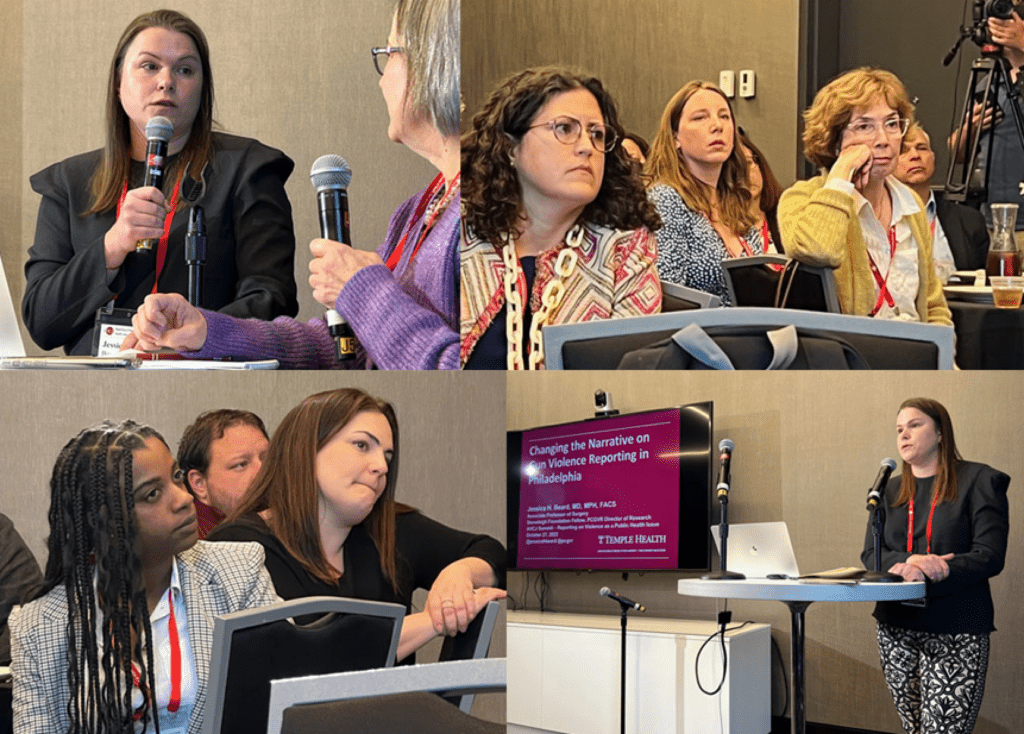
Imagine you’re watching the local news. The familiar anchor shares stories of death by suicide. She shares names and details the methods used. Then, quickly, she pivots to an expected snow storm or the upcoming Eagles game.
Today, this seems absurd. It has become the norm that media outlets do not report on individual deaths by suicide. Instead, the issue is covered, appropriately, as a public health matter. Additionally, stories generally include links to resources for readers, recognizing that the subject matter can be traumatizing. In fact, explicit journalistic standards now guide reporters in how to engage with the topic. But, this was not always the case.
The way reporters currently engage with the issue of suicide is a result of activism, advocacy, and research. And, according to Dr. Jessica Beard, PCGVR’s Director of Research, we need to consider a similar journey in our coverage of community gun violence. Each night, we hear stories of firearm violence. These episodic reports include visuals – police tape, shell casings, blood, or even a sheet-covered body. A neighborhood is mentioned. Sometimes, a name.
Decades ago, research revealed that the way journalists covered death by suicide was actually leading to increases in similar attempts and deaths. Could the same be true about community firearm violence? Might the way we report on gun violence stigmatize communities, increase fear, and even lead to increases in violence?
As a trauma surgeon at one of Philadelphia’s busiest trauma centers, Dr. Beard sees the impact of community gun violence regularly. In conducting research with her own patients, she discovered that reporting on community gun violence can be harmful and dehumanizing. But, questions remain. These questions are giving shape to an emerging research agenda that could have a significant impact on the way we report on gun violence.
First, Dr. Beard hopes to achieve consensus on a definition of harmful reporting. Through this research, she also hopes to identify metrics to assess and analyze harmful reporting, including assessing whether this type of reporting disproportionately impacts certain communities.
Once a clearer understanding of the issue is achieved, then solutions can be proposed – including journalistic standards, like the ones that currently exist for death by suicide or mass shooting events. “I don’t know that we can change reporting,” Dr. Beard says, “but we can produce evidence, influence practices, and suggest guidelines.”
Currently, Dr. Beard’s research involves analyzing over 7,000 clips of local coverage of gun violence. She’s trying to assess how often the issue is examined through a public health lens. But, the urgency of the moment drives her to explore other questions as well. Are there ways we can reduce harmful reporting as we seek to better understand it? What barriers exist that may make it challenging to influence journalistic practices?
While a Stoneleigh Foundation fellowship allows Dr. Beard to pursue this research in addition to her clinical work, the long-term dream “would be an endowed chair at Temple that would provide the flexibility to spend significant time on research.” For now, supported by The Center, she will seek to create the research basis to minimize harm done by community firearm violence coverage so that we can pursue our mission to advance empathetic, ethical, and impactful journalism.
One day, when you watch the local news, you might not see those pictures of chalk markings and police tape. You might think back to the time when episodic coverage of violence – rather than a public health approach – was the norm. You might even wonder why things changed.
Dr. Beard will most certainly know the answer.
Between now and the end of 2022, The Philadelphia Center for Gun Violence Reporting aims to raise $15,000 and enlist ten new monthly donors. This campaign – New. Needed. Now. – will profile those working with The Center to advance empathic, ethical, and impactful journalism through research, improved journalistic practices, credible messenger reporting, and solutions-oriented convenings about Philadelphia’s gun violence crisis . Please consider making a gift today.
If you or someone you know is suicidal, in crisis, or in need of general mental health support, please know help is available. You can contact your physician, local hospital emergency room, or any of the hotlines, text lines, web chats, and support groups listed below. Most are free and confidential resources. Many are available 24 hours a day, 7 days a week.
• National Suicide Prevention Lifeline: 800-273-TALK (8255)
• Crisis Text Line: 741741
• Lifeline Chat web chat service
• Samaritans’ Helpline: (877) 870-4673 (available in 240+ languages)
Journalists: Take this online course on Responsible Reporting on Suicide. (You can audit for free or pay to get certified.)